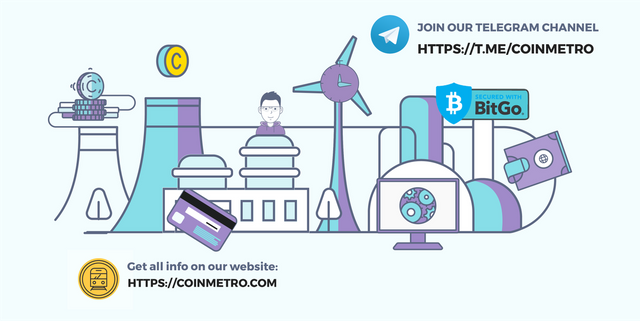CoinMetro: Bridging the Gap Between Blockchain-Based Digital Assets and Traditional Markets

Stocks. Commodities (e.g. Gold, Oil). Futures. ETF's. Mutual Funds. Government Bonds. Corporate Bonds. Forex. Options. Cryptocurrency. Asset trading is an absolutely massive industry. But one of these asset classes listed above is a newcomer to the list. It's tiny in comparison to all the other asset classes which dwarf it, but it's by far the fastest growing asset class. If you're still reading, you know which asset class I'm talking about: Cryptocurrency.
The asset class is continually berated time-and-time again by old white male dinosaurs, among many others. Why? There's no shortage of reasons, but as pretty much anyone involved in cryptocurrency knows, at some level these people are 'afraid' of cryptocurrency. They are unsure what will happen with it. Will cryptocurrency ever start to challenge fiat currency? How will that affect their jobs in these more traditional industries? What will happen to their pension? Their buying power? Their wealth? Will is slowly wither away as more and more people get involved in cryptocurrency and they're left out in the cold?
At some level, I believe the majority of people who berate and discredit cryptocurrency WANT to get involved, however, they feel as if it's too technical and advanced for them, or that they won't be able to 'catch up'. They feel it's a thing only for millennials (and younger). They also feel they're too late to 'the game', decide not to invest because of that, and don't want to see other people profit because of that. But at some level they know what's happening to cryptocurrency is the same thing that happened to the internet - embraced by young nerdy go-getters to start, but eventually embraced by almost all generations. Some just got into the game a lot later than others.
The Solution

In order to increase adoption what's needed is to bridge the gap between these more traditional markets and blockchain based assets. One of the reasons I mentioned earlier that people part of the old system are currently uncomfortable getting involved in cryptocurrency is because cryptocurrency doesn't operate the same as traditional markets they're more used to. CoinMetro is addressing that by bridging that gap, bringing many people into the crypto world who were too afraid to get involved before because of their unfamiliarity with it.
What is CoinMetro offering? A lot. Here's a short list of 6 basic things, but you'll find a lot more in their white paper.
1. Exchange merging traditional and crypto markets with both fiat & cryptocurrency deposits and withdrawals.
2. Trading platform.
3. Lending options.
4. Atomic Swap support.
5. ICO Express platform - basically a way to invest in ICO's through their exchange, something no other exchange in the world is offering to my knowledge.
6. Cold wallet storage (via BitGo).
I'm not going to get technical about just about how their platform is going to work; that's not the purpose of this article. For more technical details, you should have a thorough read over their White Paper.
I will add that their team looks pretty impressive to me. Their CEO, Kevin Murcko is also the CEO of FXPIG, a Forex brokerage. Coinmetro also has a stacked team of developers including Anton Corbijn, Timur Khakimov, Rory Baxter, and Dunhao Zhuang. What I do want to talk about though is their token buyback program.
Token Buyback Program
The prices of tokens issued by ICO's are known for being highly volatile once issued. Wide swings of +500% and -80% are not uncommon, even among the most reputable projects out there. CoinMetro is so confident in their platform longterm that they are electing to offer what they term a 'token buyback program'. The token buyback program will help enable CoinMetro to stabilize the price, without having ever setting a price for a token.
Many projects attempt to set 'price targets' for tokens after their ICOs conclude. There's two major problems with this.
1. By trying to set a future price for the token (which would be higher obviously than what the investor paid during the ICO), the project is almost guaranteeing that their token will be considered a security rather than merely a utility token. This is because an 'oppotunity to profit' is a hallmark of a security, and by trying to set a higher trading price in the future, they are inherently saying people will likely profit if they invest. CoinMetro's solution is pretty genius - they are in no way saying it's an opportunity to profit, but they are attempting to 'de-risk' the sitution for the investor by offering the buyback opportunity.
2. Ultimately the price of the token trades at whatever the free market decides it will be traded at. The major factor at determining what a fair price is, is public perception and opinion. The company can say x token is worth y price in an attempt to convince people it's worth said value, but ultimately they have no mechanism to control that. While it's possible CoinMetro's XCM token could indeed trade below the value during the ICO, if that were to happen, it would make financial sense for those who bought during the ICO to get their funds back via the buyback program rather than selling on the CoinMetro platform or a 3rd party exchange, as they would stand to receive more funds back through the buyback program in such a case.
Despite this, there are most definitely risks involved here. Make sure you have a good read through their white paper and do your own research before considering to invest
Congratulations @paulsib! You have received a personal award!
Click on the badge to view your Board of Honor.
Do not miss the last post from @steemitboard:
Congratulations @paulsib! You received a personal award!
You can view your badges on your Steem Board and compare to others on the Steem Ranking
Do not miss the last post from @steemitboard:
Vote for @Steemitboard as a witness to get one more award and increased upvotes!